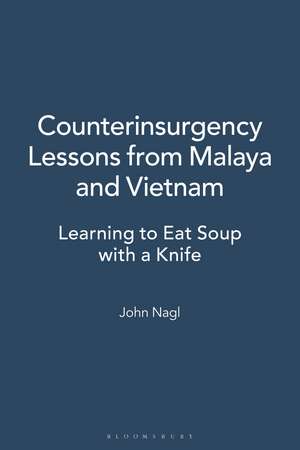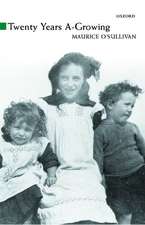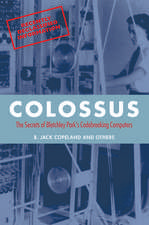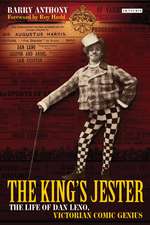Counterinsurgency Lessons from Malaya and Vietnam: Learning to Eat Soup with a Knife
Autor John Naglen Limba Engleză Hardback – 29 oct 2002 – vârsta până la 17 ani
Preț: 552.07 lei
Preț vechi: 754.65 lei
-27% Nou
Puncte Express: 828
Preț estimativ în valută:
105.64€ • 110.57$ • 87.92£
105.64€ • 110.57$ • 87.92£
Carte tipărită la comandă
Livrare economică 31 martie-14 aprilie
Preluare comenzi: 021 569.72.76
Specificații
ISBN-13: 9780275976958
ISBN-10: 0275976955
Pagini: 272
Dimensiuni: 156 x 235 x 26 mm
Greutate: 0.54 kg
Editura: Bloomsbury Publishing
Colecția Praeger
Locul publicării:New York, United States
ISBN-10: 0275976955
Pagini: 272
Dimensiuni: 156 x 235 x 26 mm
Greutate: 0.54 kg
Editura: Bloomsbury Publishing
Colecția Praeger
Locul publicării:New York, United States
Notă biografică
JOHN A. NAGL is Commander of the 1st Battalion, 34th Armor at Fort Riley, Kansas. He holds an M.Phil. and a D.Phil. in international relations from Oxford University.
Cuprins
PrefaceIntroductionSetting the StageHow Armies LearnThe Hard Lesson of InsurgencyThe British and American Armies: Separated by a Common LanguageMalayaThe Malayan Emergency, 1948-1951The Empire Strikes Back, 1952-1957VietnamThe Advisory Years, 1950-1964The Fighting Years, 1965-1972Lessons from Malaya and VietnamComparing British and American Counterinsurgency LearningLearning to Eat Soup with a KnifeBibliographyIndex
Recenzii
[A]n acclaimed book on counterinsurgency.
If you're interested in the intellectual arguments that are shaping the surge and changes in military doctrine brought on by the failures so far in Iraq, this is a great place to start.
[B]rutal in its criticism of the Vietnam-era Army as an organization that failed to learn from its mistakes and tried vainly to fight guerrilla insurgents the same way it fought World War II. . . . [c]ontrasts the U.S. Army's failure with the British experience in Malaya in the 1950s. The difference: The British, who eventually prevailed, quickly saw the folly of using massive force to annihilate a shadowy communist enemy. . . . Colonel Nagl's book is one of a half dozen Vietnam histories-most of them highly critical of the U.S. military in Vietnam-that are changing the military's views on how to fight guerrilla wars.
[T]he insurgents-always-win school skips over the textbook example of successful counterinsurgency, the British victory in Malaysia in the 1950s over a communist guerrilla movement. The British experience is related in John Nagl's cult-classic book Counterinsurgency Lessons From Malaya and Vietnam. It has become a must-read for high-level officers in Iraq because its lessons seem so directly applicable to the situation there.
[O]ne of the finest books written on how to fight an insurgency, have an open culture that encourages adaptability and innovation [and] quick turnaround on lessons learned.
Pentagon insiders say that the Army chief of staff, General Peter Schoomaker, has distributed copies of Nagl's book to all Army generals. Whether they will learn Lawrence's lessons remains to be seen.
[An] excellent stud[y]. . . . very important.
[W]ell-crafted comparison of the British and U.S. responses to the challenges of insurgency in Malaya and Vietnam.
[J]ohn Nagl's book is a valuable asset for identifying key aspects of a succesful counterinsurgency strategy. Lessons from the Malaya insurgency and the Vietnam conflict should be beneficial for American political and military leaders.
[N]agl provides an in-depth analysis of the military institutions and how they adapted to effectively combat an unconventional enemy. . . . Impeccably researched and well written, Nagl has chosen a subject critical to today's Army, namely, how to defeat an insurgent enemy. He contends that to succeed in future savage wars of peace, the Army must adapt as an organization and step away from the preoccupation with solely waging conventional warfare against other nation states. Overall, this is a great book and must be read.
John Nagl takes a fresh look at the differences in the organizational culture of the British and U.S. armies, how this difference affected their respective approaches to Malaya and Vietnam, and how it contributed to victory for one and failure for the other. The volume is strongly recommended for students of counterinsurgency, as it is well crafted, draws on extensive primary sources and secondary research, and is lucidly written. The lessons could not be more poignant. . . . [s]mall wars are not going away, and the U.S. Army had better learn how to fight them.
[A]ttempts to shake up the Army by getting it to seriously consider the neglected field of counterinsurgency. For this, Nagl deserves kudos. . . . [t]his is an important book because it raises the need to reconsider the Army's readiness to conduct counterinsurgency. Counterinsurgency should not be the exclusive realm of the SOF community because many of the tools for counterinsurgency belong to the conventional force. Insurgency is likely in the current operating enviornment. The force needs to prepare to meet it; the debate on how best to do it should begin now.
As the author ably points out, the U.S Army in its arrogance thought that it had nothing to learn from the British or French experience or even from the success of the U.S. Marine Corps Combined Action Program. This narrow vision and self-inflicted blindness persisted, and finally the U.S. Army found the fight that fit its view in the 1991 Gulf War. A victory in the Gulf was all well and good, but as the author concludes, small wars are not going away, and the U.S. Army had better learn how to fight them.
[O]f timely interest. . . . [s]eeks to explain how conventionally trained armed forces can learn to adapt to unconventional problems in the course of a conflict.
If you're interested in the intellectual arguments that are shaping the surge and changes in military doctrine brought on by the failures so far in Iraq, this is a great place to start.
[B]rutal in its criticism of the Vietnam-era Army as an organization that failed to learn from its mistakes and tried vainly to fight guerrilla insurgents the same way it fought World War II. . . . [c]ontrasts the U.S. Army's failure with the British experience in Malaya in the 1950s. The difference: The British, who eventually prevailed, quickly saw the folly of using massive force to annihilate a shadowy communist enemy. . . . Colonel Nagl's book is one of a half dozen Vietnam histories-most of them highly critical of the U.S. military in Vietnam-that are changing the military's views on how to fight guerrilla wars.
[T]he insurgents-always-win school skips over the textbook example of successful counterinsurgency, the British victory in Malaysia in the 1950s over a communist guerrilla movement. The British experience is related in John Nagl's cult-classic book Counterinsurgency Lessons From Malaya and Vietnam. It has become a must-read for high-level officers in Iraq because its lessons seem so directly applicable to the situation there.
[O]ne of the finest books written on how to fight an insurgency, have an open culture that encourages adaptability and innovation [and] quick turnaround on lessons learned.
Pentagon insiders say that the Army chief of staff, General Peter Schoomaker, has distributed copies of Nagl's book to all Army generals. Whether they will learn Lawrence's lessons remains to be seen.
[An] excellent stud[y]. . . . very important.
[W]ell-crafted comparison of the British and U.S. responses to the challenges of insurgency in Malaya and Vietnam.
[J]ohn Nagl's book is a valuable asset for identifying key aspects of a succesful counterinsurgency strategy. Lessons from the Malaya insurgency and the Vietnam conflict should be beneficial for American political and military leaders.
[N]agl provides an in-depth analysis of the military institutions and how they adapted to effectively combat an unconventional enemy. . . . Impeccably researched and well written, Nagl has chosen a subject critical to today's Army, namely, how to defeat an insurgent enemy. He contends that to succeed in future savage wars of peace, the Army must adapt as an organization and step away from the preoccupation with solely waging conventional warfare against other nation states. Overall, this is a great book and must be read.
John Nagl takes a fresh look at the differences in the organizational culture of the British and U.S. armies, how this difference affected their respective approaches to Malaya and Vietnam, and how it contributed to victory for one and failure for the other. The volume is strongly recommended for students of counterinsurgency, as it is well crafted, draws on extensive primary sources and secondary research, and is lucidly written. The lessons could not be more poignant. . . . [s]mall wars are not going away, and the U.S. Army had better learn how to fight them.
[A]ttempts to shake up the Army by getting it to seriously consider the neglected field of counterinsurgency. For this, Nagl deserves kudos. . . . [t]his is an important book because it raises the need to reconsider the Army's readiness to conduct counterinsurgency. Counterinsurgency should not be the exclusive realm of the SOF community because many of the tools for counterinsurgency belong to the conventional force. Insurgency is likely in the current operating enviornment. The force needs to prepare to meet it; the debate on how best to do it should begin now.
As the author ably points out, the U.S Army in its arrogance thought that it had nothing to learn from the British or French experience or even from the success of the U.S. Marine Corps Combined Action Program. This narrow vision and self-inflicted blindness persisted, and finally the U.S. Army found the fight that fit its view in the 1991 Gulf War. A victory in the Gulf was all well and good, but as the author concludes, small wars are not going away, and the U.S. Army had better learn how to fight them.
[O]f timely interest. . . . [s]eeks to explain how conventionally trained armed forces can learn to adapt to unconventional problems in the course of a conflict.
















